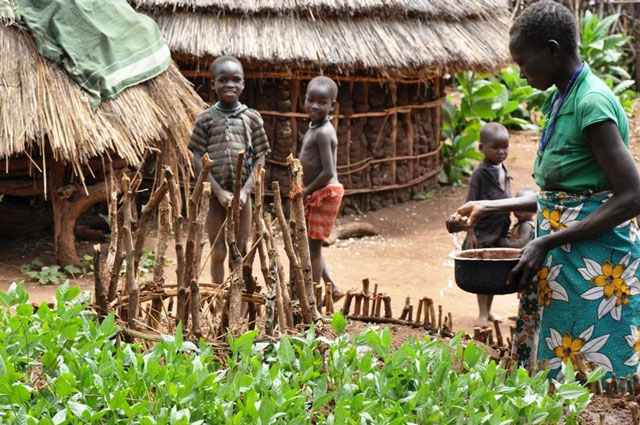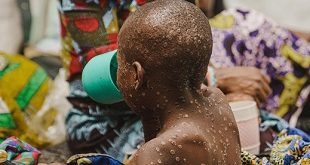
Napak, Uganda | THE INDEPENDENT | Like many communities in Sub-Saharan Africa, the population of Karamoja region, located in northeastern Uganda, is highly dependent on subsistence agriculture for food security and livelihoods. This makes them extremely vulnerable to climate change.
The region receives little amount of rainfall with long period of drought from September to mid March, leaving the region totally dry making it hard for the families to afford meals.
This long draught makes the region dependent on vegetables supplied from Bugisu and Teso regions, sold at high prices that families cannot afford.
That harsh situation has opened the eyes of the women, particularly being the bread winners in the Karimojong tradition, thus having to ensure that vegetables are available in the household during the dry spell.
URN visited some of the homes in Napak district and found that many households have resorted to planting vegetables in a kitchen garden, making it easier for the family to continue having meals. Even if there is no flour, the children can at least take greens alone.
Ms. Mary Nate, a mother of five and a resident of Iriiri Sub County in Napak district said planting vegetables in a kitchen garden has helped her keep her children alive and healthy when even amidst drought where its very hard to get vegetables.
She narrated that the knowledge that she gained from her friends in Teso on how to plant vegetables in kitchen gardens has reduced stressed from her life.
“As you know the history of Karamoja, it’s a responsibility of women to ensure that there is food at home, build houses while men go for grazing animals and provide security at home so I have to struggle to see that children have food at home and last year it was so difficult,” she said.
She said the drought of last year made her children become malnourished since she couldn’t afford the vegetable prices in the markets adding that this time should not be the same.
Ms. Nate, who has four kitchen gardens one for (Boo) a green vegetable, another one for tomatoes while other two are for Sukuma wiki, said since she embarked on home vegetable growing, she has not faced any challenge of feeding the family.
“I am finding it easy whether during drought or rain season, I don’t lack vegetables, I have them in plenty, “She said.
According to Ms Nate during dry season as of now she rides her bicycle for four kilometers to get water from the borehole to water her vegetables.
She said sometimes she also takes her greens for sale in Napak district if she wants to buy other household items such as soap, sugar and may be meat for changing diet.
So far Nate has trained many other women to plant vegetables in the kitchen, and she says almost every household in her village now has kitchen gardens.
“When Ms. Nate introduced an idea to us on how to do this practice, it looked like it was difficult but it became easier when we continued and as we speak, this initiative has secured me Shs 300, 000 that I would have spent for buying vegerables such as tomatoes, onions and sukuma wiki but my children just pick from the kitchen garden and cook,” said Marget Nakolong, another woman.
Ms Nakolong said that the only items they buy from the shops mostly are salt, soap, paraffin and matchboxes.
Kitchen gardening, which is the practice where plants (such as vegetables or herbs) are planted and being watered, is really taking root in Karamoja and Turkana.
Joyce Nacugei another woman from Auriki Akinei village in Iriiri Sub County said the practice of growing vegetables in Kitchen gardens has made many mothers in Napak district kick out malnutrition among their children.
“In the past malnutrition was the major problem that used to kill our children but right now our children don’t die out malnutrition may be malaria and other complicated disease but not again malnutrition,” she said.
Mr. Simon Lokol one of the Science teachers of Kapkwata primary school in Napak said the schools have also copied the practice saying it has simplified the feeding of children in schools.
He said most of the schools in the district and the region have kitchen gardens for vegetables.
“Right now if you go to any nearby market, you will find greens brought from Mbale 250 kilometers away from Karamoja and they are very expensive which the school can’t afford so, planting vegetables in the kitchen gardens has helped many families and schools to contain the increasing prices of vegetables,” he explained.
Mr. Lokol said Karamoja region can do very well with Agriculture through irrigation scheme if government could only provide irrigation scheme in the region.
“The drought that Karamoja experiences always is devastating just because we don’t have irrigation but the soil is very fertile,” he said.
Mr. Patrick Okotel, the senior engineer in the ministry of water and sanitation in charge of water for production in the greater Eastern Uganda says government is making effort to construct multibillion dams for irrigation schemes in Karamoja.
“Already we have some big dams in Karamoja like Arecek in Napak and Kobebe in Moroto and more dams are yet to be constructed in the region for food production,” he said. End
********
URN
 The Independent Uganda: You get the Truth we Pay the Price
The Independent Uganda: You get the Truth we Pay the Price



